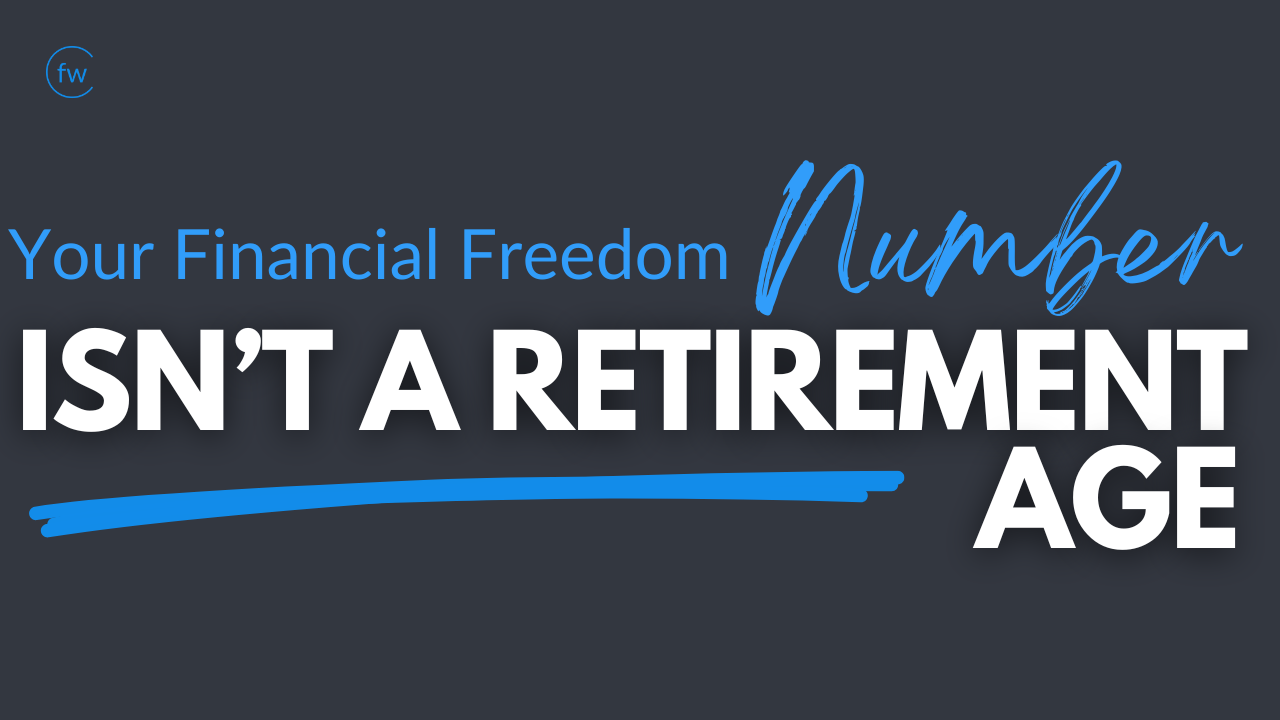What Is Your Real Financial Freedom Number?
Feb 03, 2026
Most high performers ask themselves at some point: “Do I actually have enough money to be secure?”
You might be saving, investing, and “checking all the boxes,” but without clarity on your financial freedom number, there’s still that nagging question: Will I ever truly have enough to retire or live a work-optional life without running out of money?
In this article (and on this week’s episode of The Fit Financial Podcast), I’ll walk you through what a financial freedom number really is, how to calculate it, and why knowing it changes everything about how you see your money.
What Is a Financial Freedom Number?
At its core, your financial freedom number is the amount of money you need invested to live your life without financial stress — whether you choose to stop working completely, scale back, or keep doing what you love on your own terms.
Most financial advisors talk about this number as “how much you need to retire.” But for my listeners, that word retirement doesn’t really fit. You’re not trying to sit on the sidelines — you want to keep living fully, maybe keep working in some way, but with the security of knowing you don’t have to. That’s the true meaning of financial freedom: work becomes optional.
Your financial freedom number is not just about dollars — it’s about what those dollars give you:
- Peace of mind → No more second-guessing if you’re “doing enough.”
- Permission → To spend and enjoy life now without guilt.
- Clarity → On what your actual target is, so you can stop stockpiling out of fear.
- Flexibility → To say “yes” to opportunities and “no” to things that drain you.
- Confidence → That your hard work has bought you more than money — it’s bought you freedom.
When you know your number, you stop living in the gray area of “I hope this is enough” and instead step into “I know I’m secure, and here’s how I want to use that security.”
We see this number not just as math, but as a mindset shift:
- It’s not just about accumulating money — it’s about aligning your resources with your values.
- It’s not a one-size-fits-all formula — it’s your lifestyle, your family, your goals, your energy.
- It’s not just “how much” — it’s what kind of life do you want your money to support?
- It’s not about perfection — it’s about clarity that lets you actually enjoy the wealth you’ve built.
So when clients ask, “What’s my number?” I guide them through both:
- The practical side (what it costs to live your life, adjusted for taxes, inflation, and growth).
- The personal side (what makes life meaningful for you, and how money supports that).
Because the truth is: even if the math says you’re fine, if you don’t feel secure, you won’t live like you are. And if you don’t feel free, what’s the point of financial freedom in the first place?
How to Calculate Your Number (The Simple Math)
A straightforward way to estimate your number:
- Add up your annual lifestyle expenses (housing, food, travel, health, fun).
- Multiply by 25 (a simplified version of the 4% rule).
- Adjust for taxes — since withdrawals are not all tax-free.
Example: If you spend $120,000 per year, you’ll need roughly $3,000,000 invested. But if most of that money sits in pre-tax accounts, your real number will be higher.
👉 Want more details? I break this down step-by-step in Episode 145 of the podcast.
Why “Enough” Looks Different for Everyone
Your number is not the same as your neighbor’s. Factors that change it include:
- Your lifestyle choices (do you want to travel often, or keep things simple?)
- Longevity and health (planning to 95 vs. 75 changes everything).
- Income flexibility (will you keep consulting or working part-time?).
- Taxes and inflation (two of the biggest blind spots).
This is why cookie-cutter retirement calculators usually fall short — they don’t account for the life you actually want to live.
The Emotional Side of Knowing Your Number
High performers like you often “stockpile” cash, even when you’re secure. Why? Because uncertainty creates anxiety.
- Knowing your number turns guessing into confidence.
- It helps you enjoy your money now, instead of feeling guilty for spending.
- It gives you permission to design a work-optional lifestyle
Blind Spots Most People Miss
Even if you’re saving diligently, here’s what can throw off your freedom number:
- Taxes: Withdrawals from IRAs/401(k)s aren’t fully yours.
- Inflation: Costs rise every decade, shrinking your buying power.
- Sequence of Returns Risk: Market downturns early in retirement can hit harder than you think.
These are exactly the areas where strategic financial planning makes the biggest difference.
✅ Action Steps to Start Today
- Write down your annual spending.
- Multiply it by 25 — that’s your baseline number.
- Check where your money is located (taxable, tax-deferred, tax-free).
- Revisit the number yearly as your lifestyle and goals evolve.
Want help? Listen to the full episode here: 🎧 The Fit Financial Podcast: What Is Your Real Financial Freedom Number?.
Final Thoughts
Your financial freedom number isn’t just a math problem — it’s the key to peace of mind. Once you know it, you can stop second-guessing and start living with clarity, security, and confidence.
If you’re ready to define your number and create a tax-smart plan around it, schedule a call with us today at fitwealthadvisors.com/contact
The Fit Wealth Show is brought to you by Plan Group Financial, Inc. (PGF) d/b/a Fit Wealth Advisors. PGF d/b/a Fit Wealth Advisors is an investment adviser registered under the Investment Advisers Act of 1940. Registration as an investment adviser does not imply any level of skill or training. This presentation has been provided for informational purposes only and is not intended as legal or investment advice or a recommendation of any particular security or strategy. The investment strategy and themes discussed herein may be unsuitable for investors depending on their specific investment objectives and financial situation. Past performance is not indicative of future results.
